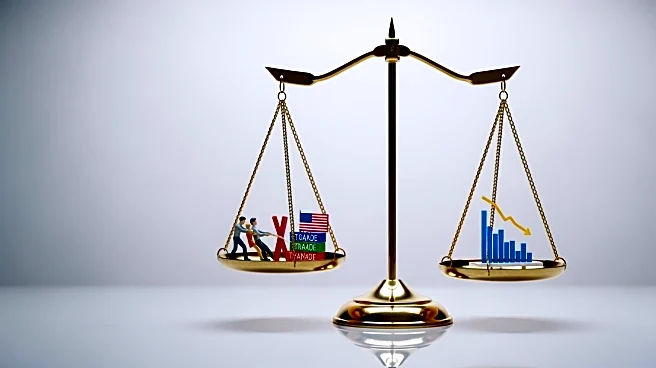What's Happening?
The U.S. dollar experienced a decline on Thursday, influenced by ongoing Sino-U.S. trade tensions and expectations of a Federal Reserve interest rate cut later this year. The euro and yen both strengthened
against the dollar, with the euro reaching a one-week high at $1.1664 and the yen firming to 150.52 per dollar. The dollar index, which tracks the greenback against six other currencies, fell by 0.16% to 98.512, marking a potential weekly decline of 0.33%. The trade dispute between the U.S. and China has intensified, with U.S. officials criticizing China's rare earth export controls, which they view as a threat to global supply chains. Despite these tensions, President Trump is expected to meet Chinese President Xi Jinping in South Korea, with hopes that some trade measures could be adjusted following the meeting.
Why It's Important?
The weakening of the U.S. dollar has significant implications for global markets and trade. A softer dollar can affect U.S. exports, making them more competitive abroad, but it can also increase the cost of imports, potentially impacting inflation. The trade tensions between the U.S. and China continue to pose risks to global supply chains, particularly in industries reliant on rare earth materials. Additionally, the anticipation of Federal Reserve interest rate cuts reflects concerns about the U.S. economic outlook, which could influence investment strategies and economic growth. Stakeholders in the financial markets, including investors and policymakers, are closely monitoring these developments as they navigate the complexities of international trade and monetary policy.
What's Next?
The upcoming meeting between President Trump and President Xi Jinping could lead to adjustments in trade policies, potentially easing some of the current tensions. Investors will be watching for any signs of progress or further escalation in the trade dispute. Additionally, the Federal Reserve's policy meetings later this year will be critical in determining the direction of U.S. interest rates, with potential rate cuts influencing economic activity and market sentiment. The evolving political situation in Japan, with the selection of a new prime minister, may also impact currency flows and economic policies in the region.
Beyond the Headlines
The trade tensions and currency fluctuations highlight the interconnectedness of global economies and the challenges of navigating international relations. The ethical considerations of trade policies, particularly those affecting rare earth materials, underscore the need for sustainable and equitable practices. Long-term shifts in economic power dynamics may arise from these developments, influencing future trade agreements and geopolitical strategies.










